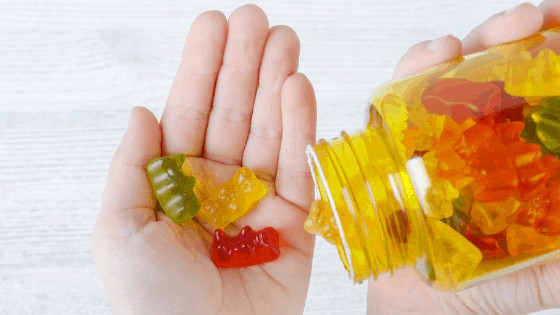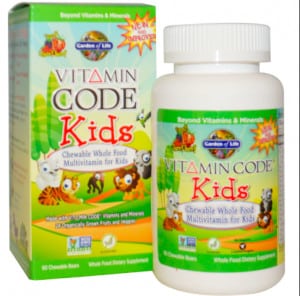
16 Feb What kid’s Multi-Vitamin Should You Be Giving?
I get the question, “what’s a good kid’s multi-vitamin?” all the time. As parents, we just want to make sure our kids are nourished and healthy. But did you know that some of those multi-vitamins on the market can actually contain vitamins and minerals that aren’t bioavailable to us and other ingredients that can harm us, which means you’re flushing your money down the toilet.
And who wants to do that? No one.
So, let’s dive into what you should be looking at in these kid vitamins.
Remember those Flintstone’s gummy vitamins that were given to us when we were kids? I know I got excited when it was “vitamin” time. Our supplement industry is BOOMING with so many different companies and supplements. It’s hard to keep track of which ones are good and which ones aren’t good.
Look For Real Food Ingredients
Plain & simple, we want our kids to be eating real whole foods right? The same goes for the supplements that we give – we don’t want cheap synthetic when we pay for supplements! I always like to see the different vegetables and fruits that the nutrients come from. An example is from the Garden of Life kid’s multi-vitamin – this is what I like to see. Remember nutrients are best when they are in synergy from the whole food.
Look For Folate, Not Folic Acid
One of the first things that I glance at when looking at a supplement is checking if they are using folic acid or folate. Chris Kresser explains it best,
Folate is a general term for a group of water soluble b-vitamins, and is also known as B9. Folic acid refers to the oxidized synthetic compound used in dietary supplements and food fortification, whereas folate refers to the various tetrahydrofolate derivatives naturally found in food. (1)
The form of folate that can enter the main folate metabolic cycle is tetrahydrofolate (THF). (2) Unlike natural folates, which are metabolized to THF in the mucosa of the small intestine, folic acid undergoes initial reduction and methylation in the liver, where conversion to the THF form requires dihydrofolate reductase. The low activity of this enzyme in the human liver, combined with a high intake of folic acid, may result in unnatural levels of unmetabolized folic acid entering the systemic circulation.
Simple terms? Folic acid is the synthetic version of folate – even though most people using the terms interchangeably thinking they are the same thing. They aren’t. Folate is more bioavailable to us versus the long breakdown of folic acid that can lead to a lot of it unmetabolized and doing nothing for your body. Most kid vitamins use folic acid, which is why I toss ’em. I look for folate only.
Look At What B12 Is Used
Here is another B vitamin that I have to look for. Most kid vitamins use cyanocobalamin as their B12 source. This source of B12 is the least bioavailable to our body. Plus, it’s pretty synthetic. Most supplements use cyanocobalamin because it’s the cheapest one to use -> red flag for me and I lose trust when I see that. I want a company that’s going to use the best of the best ingredients for me and my family. I look for methylcobalamin. Methylcobalamin doesn’t have to convert in the body – it’s in the form that is readily used by our body.
Look At “Other” Ingredients
This is a HUGE rule for me. In the “other” ingredients below the nutrient facts, you’d be surprised what you see there. First rule is to find a supplement that doesn’t have many ‘other’ ingredients in the first place. It’s the same idea with food. You don’t want eat something that has too many ingredients that aren’t natural.
You might find artificial flavors, which are usually sourced from petroleum or other inedible things, that are created to mimic natural flavors. Gross. You might find food coloring that has been linked to hyperactivity in children, allergic reactions, and animal studies showing that it causes tumors. You might also find preservatives. Artificial sweeteners can be pretty popular too – in the example below there was aspartame that is used. Dr. Axe talks about the many dangers of articial sweeteners, but diving into specifically aspartame (like in this supplement), he states,
This study found that aspartame may impair memory performance and increase oxidative stress in the brain. In addition, if you are pregnant or nursing, avoid this dangerous artificial sweetener at all costs. A recent study points to alarming news for women who consume artificial sweeteners during pregnancy or while breastfeeding. It appears that aspartame, in particular, can predispose babies to metabolic syndrome disorders, and obesity, later in life. (9)
Common side effects of aspartame include headaches, migraines, mood disorders, dizziness and episodes of mania. Comprising phenylalanine, aspartic acid and methanol, these substances can stay in the liver, kidneys and brain for quite some time.
This is only just SOME of the ingredients that you could find in ‘other’ section. We must become label readers with our supplements too!
Organic or Not Organic?
I like to take this into account when I’m trying to buy the best for my kiddos. I try to minimize the amount of Round-Up that we ingest. If you are wondering about Round-Up dangers, you can read it here.
My Favorite Kid’s Multi-vitamin
We really trust Garden of Life company. We have used their kid’s multi-vitamin before and really like it! We love it’s organic and that the ingredients are pretty clean. (Click the picture if you want to order it!)

Another vitamin that I was really impressed with was Dr. Mercola’s Kids Multi. Now, this is another natural doctor that I trust. All of the vitamins and minerals are in their most bioavailable form to create maximum absorption. Another thing I love and was impressed with is that iron is not included in the vitamin. When iron and vitamin E are in the same nutritional supplement, the iron destroys the vitamin E, so you most likely aren’t getting the nutrients you think you are. (Click the picture to order!)
Do you use kid’s multivitamins in your family? If so, which one do you use?


